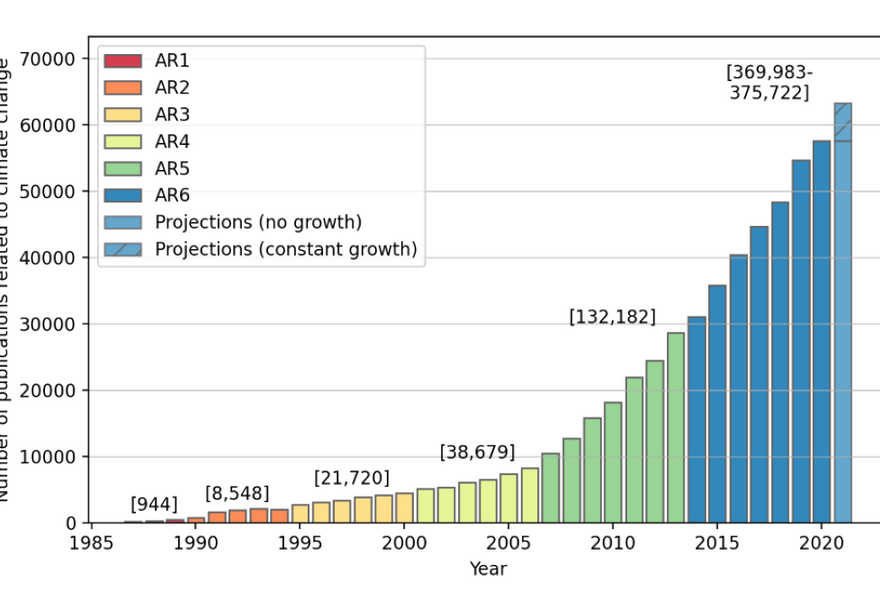Research on climate solutions to become as well organised as that in the health sector
Led by the MCC: a new international network under the umbrella of the Campbell Collaboration consolidates findings, identifies knowledge gaps, and facilitates policy advice.

Climate study statistics: ahead of AR6, the Sixth Assessment Report of the Intergovernmental Panel on Climate Change (IPCC), the "Web of Science" database is overflowing – research synthesis provides clarity. | Photo: MCC
The fact that scientists are playing such a strong role in the coronavirus crisis, with their expertise so intensively sought after by policy-makers, is in large part due to the structure of the knowledge generation. Evidence synthesis, which collates, appraises, and summarises results from individual studies across an evidence base and makes them available for policy advice, is particularly well organised in the health sciences; a key role is played here by the global knowledge network Cochrane, founded in 1993 and seated in London. This successful model is now to be transferred from the health sector to the field of climate policy advice. One driver of this modernisation is the Berlin-based climate research institute MCC (Mercator Research Institute on Global Commons and Climate Change).
"It is enormously important that decision-makers can draw on the most robust scientific knowledge on policy options," says Jan Minx, head of the MCC working group Applied Sustainability Science. "Policy advice should depend as little as possible on individual studies, but be based rather on robust insights from multiple, independently produced studies. In synthesis, as in primary research, much depends on the application and further development of powerful methods. We now want to support this process for the field of climate policy solutions by establishing a new international network under the umbrella of the Campbell Collaboration."
The Campbell Collaboration, headquartered in Oslo, organises evidence synthesis in the social sciences. Minx is now co-chair of the "Campbell Climate Solutions Coordinating Group", which was formally constituted last year and is now beginning work. Campbell Coordination Groups have existed for some time on such topics as corporate governance, education, and crime prevention; a list of 50 freely available evidence syntheses relevant to social welfare decision-making in the context of the coronavirus pandemic can be found here. The new group on climate solutions will primarily provide guidance by coordinating relevant meta-studies internationally, but will also organise scientific symposia, and for the first time provide a formal framework for global professional exchange.
"By creating a network like this we hope to shed light on the state of research knowledge on solutions to the climate crisis," explains Neal Haddaway, Senior Researcher at MCC and also co-chair of the new group. "Many stakeholders will benefit if we create maps of research knowledge, thereby making knowledge gaps, more recognisable. For example, we need more robust insights into how well various climate policy instruments work in different environmental, social and political contexts."
The literature on climate research is growing exponentially, with several tens of thousands of studies currently produced each year. For the MCC as a scientific think tank, the evidence synthesis competence is a cornerstone when it comes to providing decision-makers with evidence-based policy options. This is supplemented by a profound competence in scientific evaluation of specific policy measures of the past (in the Policy Evaluation Lab), and the MCC Policy Unit orientates the Institute's interface towards politics and society in terms of concept and content.
Further information:
- Editorial on the foundation of the Campbell Climate Solutions Coordinating Group (CSCG):
Berrang-Ford, L., Döbbe, F., Garside, R., Haddaway, N., Lamb, W., Minx, C., Viechtbauer, W., Welch, V., White, H., Editorial: Evidence synthesis for accelerated learning on climate solutions, 2021, Campbell Systematic Reviews
https://doi.org/10.1002/cl2.1128 - CSCG website:
https://campbellcollaboration.org/contact/coordinating-groups/climate-solutions.html





